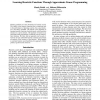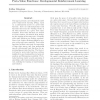141 search results - page 10 / 29 » Fuzzy Kanerva-based function approximation for reinforcement... |
AIPS
2008
13 years 10 months ago
2008
Planning problems are often formulated as heuristic search. The choice of the heuristic function plays a significant role in the performance of planning systems, but a good heuris...
ICRA
2009
IEEE
14 years 2 months ago
2009
IEEE
Abstract— Continuous action sets are used in many reinforcement learning (RL) applications in robot control since the control input is continuous. However, discrete action sets a...
ICML
2005
IEEE
14 years 8 months ago
2005
IEEE
This paper presents a novel framework called proto-reinforcement learning (PRL), based on a mathematical model of a proto-value function: these are task-independent basis function...
PKDD
2009
Springer
14 years 2 months ago
2009
Springer
Abstract. Innovations such as optimistic exploration, function approximation, and hierarchical decomposition have helped scale reinforcement learning to more complex environments, ...
AAAI
2008
13 years 10 months ago
2008
Off-policy reinforcement learning is aimed at efficiently reusing data samples gathered in the past, which is an essential problem for physically grounded AI as experiments are us...


